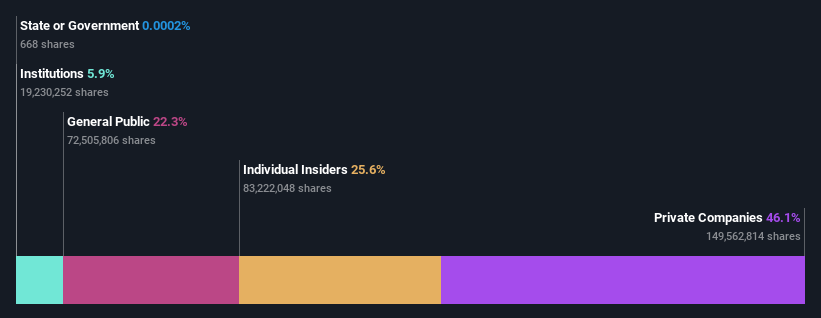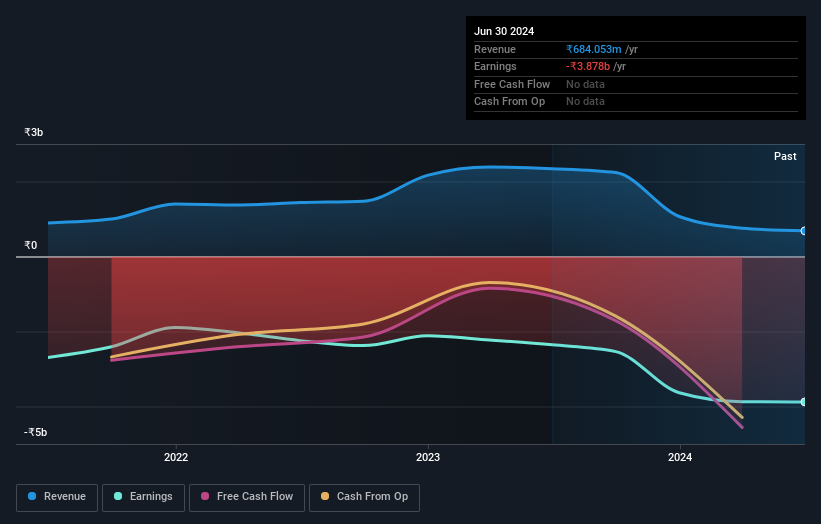Sun Pharma Advanced Research Company Limited's (NSE:SPARC) market cap rose ₹4.5b last week; private companies who hold 46% profited and so did insiders
Key Insights
- The considerable ownership by private companies in Sun Pharma Advanced Research indicates that they collectively have a greater say in management and business strategy
- A total of 2 investors have a majority stake in the company with 61% ownership
- Insiders own 26% of Sun Pharma Advanced Research
A look at the shareholders of Sun Pharma Advanced Research Company Limited (NSE:SPARC) can tell us which group is most powerful. And the group that holds the biggest piece of the pie are private companies with 46% ownership. Put another way, the group faces the maximum upside potential (or downside risk).
Private companies gained the most after market cap touched ₹70b last week, while insiders who own 26% also benefitted.
In the chart below, we zoom in on the different ownership groups of Sun Pharma Advanced Research.
View our latest analysis for Sun Pharma Advanced Research

What Does The Institutional Ownership Tell Us About Sun Pharma Advanced Research?
Institutions typically measure themselves against a benchmark when reporting to their own investors, so they often become more enthusiastic about a stock once it's included in a major index. We would expect most companies to have some institutions on the register, especially if they are growing.
As you can see, institutional investors have a fair amount of stake in Sun Pharma Advanced Research. This implies the analysts working for those institutions have looked at the stock and they like it. But just like anyone else, they could be wrong. It is not uncommon to see a big share price drop if two large institutional investors try to sell out of a stock at the same time. So it is worth checking the past earnings trajectory of Sun Pharma Advanced Research, (below). Of course, keep in mind that there are other factors to consider, too.

We note that hedge funds don't have a meaningful investment in Sun Pharma Advanced Research. Our data shows that Shanghvi Finance Pvt Ltd is the largest shareholder with 42% of shares outstanding. In comparison, the second and third largest shareholders hold about 19% and 3.2% of the stock.
A more detailed study of the shareholder registry showed us that 2 of the top shareholders have a considerable amount of ownership in the company, via their 61% stake.
While it makes sense to study institutional ownership data for a company, it also makes sense to study analyst sentiments to know which way the wind is blowing. Our information suggests that there isn't any analyst coverage of the stock, so it is probably little known.
Insider Ownership Of Sun Pharma Advanced Research
The definition of company insiders can be subjective and does vary between jurisdictions. Our data reflects individual insiders, capturing board members at the very least. Company management run the business, but the CEO will answer to the board, even if he or she is a member of it.
I generally consider insider ownership to be a good thing. However, on some occasions it makes it more difficult for other shareholders to hold the board accountable for decisions.
It seems insiders own a significant proportion of Sun Pharma Advanced Research Company Limited. Insiders own ₹18b worth of shares in the ₹70b company. This may suggest that the founders still own a lot of shares. You can click here to see if they have been buying or selling.
General Public Ownership
The general public, who are usually individual investors, hold a 22% stake in Sun Pharma Advanced Research. While this group can't necessarily call the shots, it can certainly have a real influence on how the company is run.
Private Company Ownership
We can see that Private Companies own 46%, of the shares on issue. Private companies may be related parties. Sometimes insiders have an interest in a public company through a holding in a private company, rather than in their own capacity as an individual. While it's hard to draw any broad stroke conclusions, it is worth noting as an area for further research.
Next Steps:
I find it very interesting to look at who exactly owns a company. But to truly gain insight, we need to consider other information, too. Case in point: We've spotted 2 warning signs for Sun Pharma Advanced Research you should be aware of.
If you would prefer check out another company -- one with potentially superior financials -- then do not miss this free list of interesting companies, backed by strong financial data.
NB: Figures in this article are calculated using data from the last twelve months, which refer to the 12-month period ending on the last date of the month the financial statement is dated. This may not be consistent with full year annual report figures.
Have feedback on this article? Concerned about the content? Get in touch with us directly. Alternatively, email editorial-team (at) simplywallst.com.
This article by Simply Wall St is general in nature. We provide commentary based on historical data and analyst forecasts only using an unbiased methodology and our articles are not intended to be financial advice. It does not constitute a recommendation to buy or sell any stock, and does not take account of your objectives, or your financial situation. We aim to bring you long-term focused analysis driven by fundamental data. Note that our analysis may not factor in the latest price-sensitive company announcements or qualitative material. Simply Wall St has no position in any stocks mentioned.
 Index Options
Index Options CME Group
CME Group Nasdaq
Nasdaq Cboe
Cboe TradingView
TradingView Wall Street Journal
Wall Street Journal